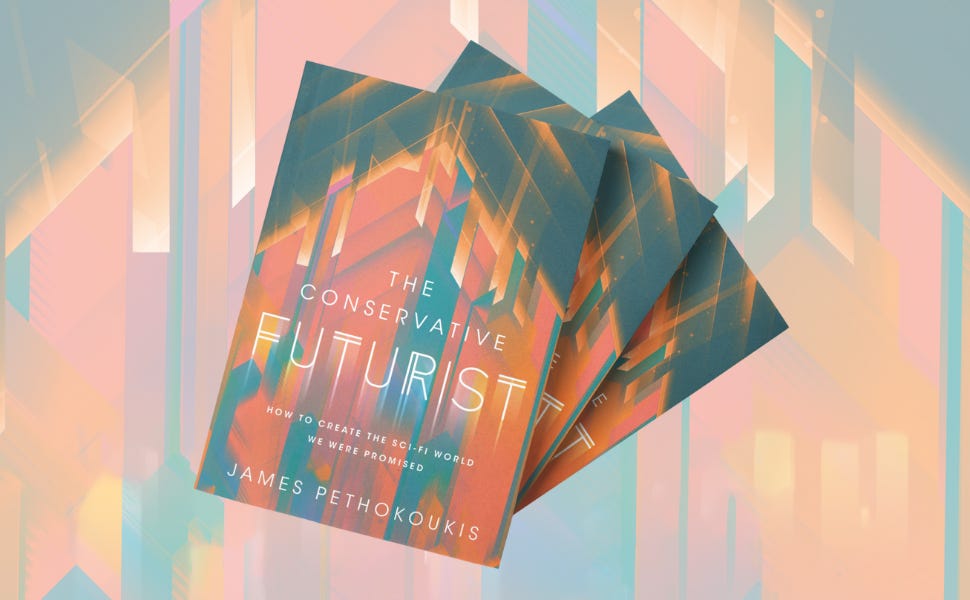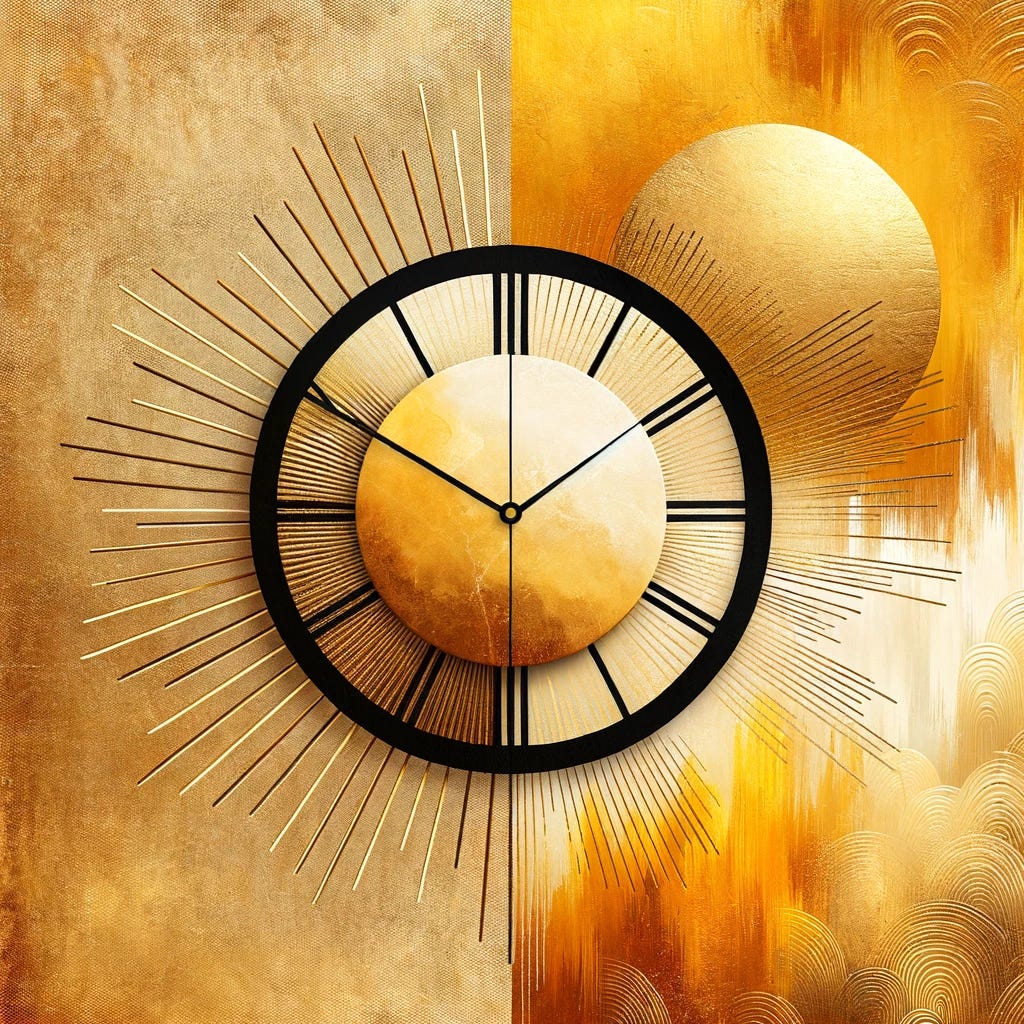🌅🕕 Forget the Doomsday Clock. We need a Genesis Clock.
How close are we to the Dawn of a new age of abundance and opportunity rather than the Midnight of our existence? ☀
Quote of the Issue
“When you think of the giant technological strides that man has made in a few millennia — less than a microsecond in the chronology of the universe — can you imagine the evolutionary development that much older life forms have taken? They may have progressed from biological species, which are fragile shells for the mind at best, into immortal machine entities—and then, over innumerable eons, they could emerge from the chrysalis of matter transformed into beings of pure energy and spirit. Their potentialities would be limitless and their intelligence ungraspable by humans.” - Stanley Kubrick, director of 2001: A Space Odyssey
I have a new book out: The Conservative Futurist: How To Create the Sci-Fi World We Were Promised is currently available pretty much everywhere. I’m very excited about it! Let’s gooooo! ⏩🆙↗⤴📈
The Essay
🌅🕕 Forget the Doomsday Clock. We need a Genesis Clock.
Warning: Things probably are about to get worse.
On Jan. 23, 2024, the Bulletin of the Atomic Scientists will reveal an update to its famous Doomsday Clock, a symbol representing the supposed likelihood of a human-made global catastrophe. Back in January of this year, the Doomsday Clock was set at 90 seconds to midnight, the closest to midnight the Clock has ever been — “the most dangerous situation that humanity has ever faced.” According to a Bulletin news release about the upcoming event:
The Bulletin of the Atomic Scientists’ Science and Security Board is reviewing multiple global threats, including the Israel-Hamas war, Ukraine-Russia war, the continued climate crisis, AI, state-sponsored disinformation campaigns, disruptive technologies, biothreats, and the intensification of nuclear weapons programs worldwide.
Given that laundry list of threats, including new ones such as generative AI and the latest outbreak of Middle East violence, a reasonable guess is that the Clock is about to get nudged forward. My guess: 60 seconds to an existentially catastrophic Midnight. Get ready for the “Minute to Midnight” headlines.
The Bulletin was founded in 1945 by a group of scientists, including Albert Einstein and J. Robert Oppenheimer, who felt they “could not remain aloof to the consequences of their work,” according to the organization, and needed to alert both policymakers and the public to the threat from atomic weapons. The Clock was first published in 1947, hands set seven minutes to midnight, to reflect “basic changes in the level of continuous danger in which mankind lives in the nuclear age,” according to Eugene Rabinowitch, another Bulletin co-founder of the Bulletin. Many new threats to be monitored have been added over the decades.
But even when the Clock was pretty much just focused on the risk of nuclear war, it proved to be an unreliable gauge.
During the 1960s, the Clock moved from two minutes to midnight at the start of the decade to ten minutes to midnight by the end. This shift was largely based on nuclear arms treaties signed between the US and Soviet Union. But we know that the 1960s had many close calls with nuclear war that were known at the time by the public. One of those instances: During the Cuban Missile Crisis, a Soviet patrol submarine nearly launched a nuclear torpedo.
In the early 1980s, the Doomsday Clock moved closer to midnight, from 7 minutes in 1981 down to 3 minutes by 1984. The Bulletin attributed this in part to President Ronald Reagan's harsh rhetoric toward the Soviet Union, including his description of it as an "Evil Empire,” as well as his military buildup and the Strategic Defense Initiative. This perspective was shared by Alan Moore in his acclaimed graphic novel Watchmen. (It was a worry shared by Watchmen writer Alan Moore and artist Dave Gibbons, who riffed on the Doomsday Clock in that classic 1980s graphic novel.) Yet Reagan's assertive stance hastened the end of the Cold War. While controversial at the time, his bold rhetoric and policies put pressure on the Soviet system and contributed to its collapse just a few years later in 1989. By 1990, with the Cold War over, the Clock was pushed back to 17 minutes from midnight.
In 2010, the Bulletin moved the Clock’s hands back a minute to six minutes, likely placing a bet on the new American president who just promised to “work tirelessly to lessen the nuclear threat and roll back the specter of a warming planet.” Indeed, the language in the announcement back then — ”We are poised to bend the arc of history toward a world free of nuclear weapons” — echoed some of Obama’s favorite phraseology. But it was not to be, thanks to “failed leadership” from unnamed politicians.
I think we need a new symbolic clock, one that suggests how close we are to the Dawn of a new age of abundance and opportunity rather than the Midnight of our existence. It would be a clock devoted to the Proactionary Principle (avoiding risk is risky) rather than the Precautionary Principle (better safe than sorry). It would be a clock that acknowledges, for instance, the problem-solving capabilities of AI rather than obsessing about how it might create science fictional dangers. From my new book The Conservative Futurist:
I call it the Genesis Clock. The name is inspired by the Genesis Device from 1982’s Star Trek: The Wrath of Khan. When initiated on an uninhabited planet, the device would begin a process of rapid terraforming, preparing the planet for human colonization. As one character in the film puts it, “What exactly is Genesis? Well, put simply, Genesis is life from lifelessness.” The Genesis Clock would attempt to tell humanity how close or distant it might be to a period so different from modern life that it would qualify as a new beginning for our civilization, a new human epoch. “New life,” one might even say.
As I explained above, the Doomsday Clock is pretty subjective in how it determines how close we are to destroying ourselves. But the factors driving the Genesis Clock would be more objective. Among those that might determine how close we are to Dawn:
How close are we to achieving artificial general intelligence?
How close are we to extending the average human lifespan to 120?
Do we have self-sustaining colonies off planet?
Do we have a cancer vaccine and a cure for Alzheimer’s?
Can we deflect a large asteroid or comet headed toward Earth?
Is carbon in the atmosphere declining?
Is commercial nuclear fusion both technologically and economically viable?
Is less than 1 percent of the world’s population undernourished with a caloric intake below minimum energy requirements?
Are we bringing back extinct species like the Woolly mammoth?
Is even the poorest nation no poorer than the average economy in 2000?
Is even the least free nation as free as the average nation in 2000?
Is productivity growth among rich nations at least 50 percent higher than its postwar average?
As I write in my book, a Genesis Clock could — in an homage to the Doomsday Clock — initially be set at 5:53 AM, just 7 minutes to a symbolic Dawn of 6 AM. This is a concept I would like to develop further. I would love to hear other ideas about the Up Wing, techno-optimistic factors that could drive a Genesis Clock.
Faster, please!
Micro Reads
▶ A Supernova ‘Destroyed’ Some of Earth’s Ozone for a Few Minutes in 2022 - Katrina Miller, NYT |
▶ SpaceX Weighs Spinning Off Starlink Via IPO as Soon as 2024 - Edward Ludlow, Gillian Tan, Esteban Duarte, and Ryan Gould, Bloomberg |
▶ Companies Tried to Spend Less on Cloud. Then AI Showed Up. - Belle Lin and Isabelle Bousquette, WSJ |
▶ Behind Microsoft CEO Satya Nadella’s push to get AI tools in developers’ hands - Mat Honan, MIT Technology Review |
▶ How Sam Altman is pushing OpenAI into the ‘Big Tech’ pantheon - Nitasha Tiku, WaPo |
▶ Microsoft is finally making custom chips — and they’re all about AI - Tom Warren, The Verge |
▶ Social Media Sleuths, Armed With AI, Are Identifying Dead Bodies - Deidre Olsen, WIRED |
▶ Amazon to Sell $2,350 Astro Robot for Businesses in Bid to Boost Interest - Mark Gurman, Bloomberg |
▶ Can Chatgpt Assist in Picking Stocks? - Matthias Pelster and Joel Val, SSRN |
▶ 3D-printed robotic hand has working tendons and muscles - Alex Wilkins, New Scientist |
▶ Crispr gene editing shown to permanently lower high cholesterol - Emily Mullin, Ars Technica |
▶ America’s Era of Bad Feelings Threatens the World - Adrian Wooldridge, Bloomberg Opinion |
▶ Korea, Japan growth experiences suggest China’s economy to slow in next 20 years - Sewon Hur and Braden Strackman, Federal Reserve of Dallas |




